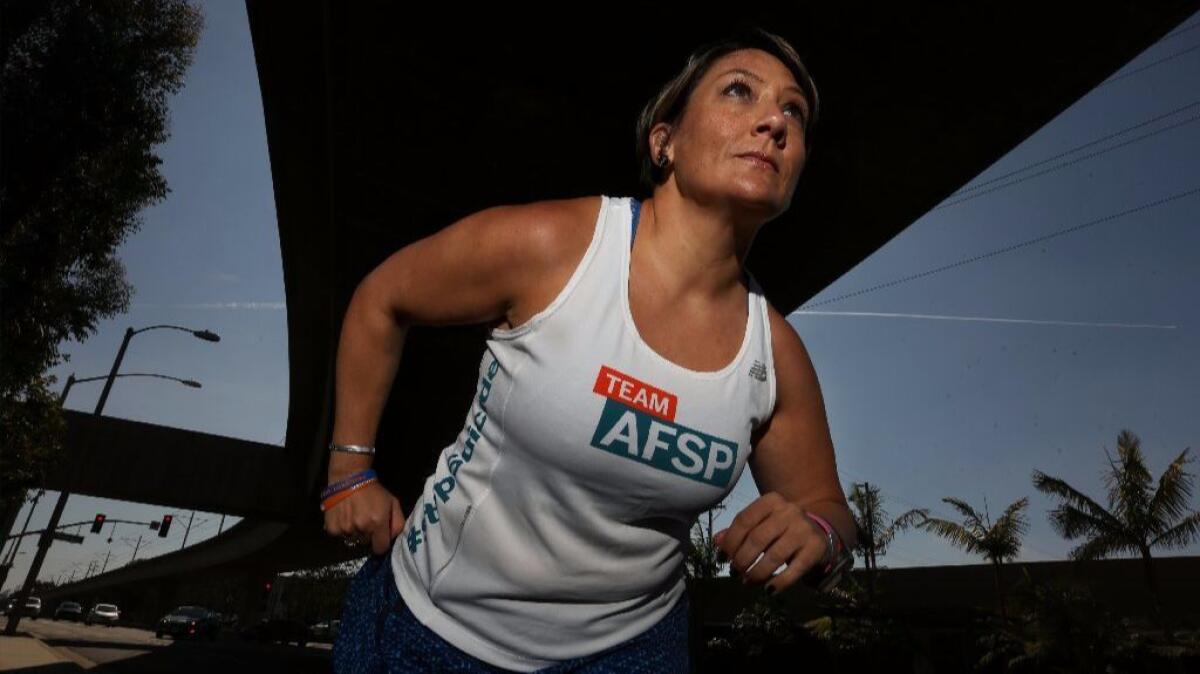Overcoming depression can be just a short — or long — run away

- Share via
The details come back to Amy Robinson when she describes the first time she told her story in front of people.
It was akin to the nervousness that comes with public speaking, but most speakers don’t expose themselves emotionally the way Robinson did when she stood in front of about 1,000 people at a community event in Santa Monica.
“I have a picture where you can almost see my knuckles are white,” Robinson said. “I’m holding onto the podium.”
Robinson found the courage to describe the years of depression that led to two suicide attempts in 2007, and her subsequent path to health through running.
After her speech, that anxiety turned to enlightenment.
“I was kissed and hugged by so many strangers,” Robinson said. “ I had no idea that was going to happen. People came up to me and said, ‘Thank you so much.’ The point of that speech was to share my story, but also to give people hope. There’s a lot of people who are needlessly suffering, and they don’t know how to ask for help.”
Robinson, 40, has since provided hope and will continue to spread encouragement when she runs in Sunday’s Los Angeles Marathon.
It will be her eighth marathon since she turned to running just two years ago. She’s not an elite runner but more representative of an event known for welcoming people from all walks of life to tackle a 26.2-mile course from Dodger Stadium to Santa Monica.
Robinson sometimes wears a race bib that reads “Anyone Who Lives With Mental Illness” to show whom she’s running for, and she emphasizes the “lives” part.
“A lot of people do struggle, but I don’t like the word struggle,” Robinson said. “I just live with it. Sometimes I think about it as a really annoying passenger in the backseat that just tries to change the radio. You’re just like, ‘Stop.’ I just have to manage it.”
It took Robinson a long time to quiet that passenger, let alone put her story out there.
Traute Winters, director of the L.A. chapter of the American Foundation For Suicide Prevention, first encouraged Robinson to do it.
“She’s definitely an inspiration and has worked really hard to get healthy again, and used running and the marathon as her lifestyle to stay healthy,” Winters said.
Depression has been in the spotlight in professional sports in recent years, but often in relation to retired NFL and NHL players who suffered head trauma during their careers. Former Dodgers pitcher Zack Greinke and former NFL running back Ricky Williams are among the more well-documented cases of depression.
Winters saw the connection between running and depression through the booth that the AFSP has at the marathon expo.
“A lot of people come up to our table and talk about how running has helped them with their depression,” Winters said. “That was a surprise to me.”
Robinson was diagnosed with depression in 2005. She turned to food and “self-medication” as coping devices and, one day, stepped on a scale and saw it read 226 pounds. Robinson sought professional help but says it took her three years to emerge from the dark space that had consumed her.
Her two suicide attempts were within three days of each other as she nearly became one of more than 44,000 people who die from suicide each year, according to the AFSP.
“There’s an inertia,” Robinson said. “You don’t want to move. You don’t want to get out of bed. I had to find something to keep me moving, to get out of bed, to combat that feeling of not wanting to do anything.”
It was difficult to say no to Riley, a Border Collie mix that was given to Robinson at the time. The responsibility got her out of the house.
“The dog was helpful, because you can’t not walk the dog,” Robinson said. “That’s not really an option. Their eyeballs get really big.”
Robinson did her first 5K without stopping in 2014. Her first marathon was L.A. last year. An Inglewood resident who works as a director of student services for a university, Robinson is a board member for the AFSP. She organizes the community walks she first spoke at and raises awareness at campuses.
Running has allowed her to cross paths with other inspiring people. Her coach is a breast cancer survivor, and last year Robinson met former Olympic middle distance runner Suzy Favor Hamilton, whose brother, Dan, committed suicide.
The depression never goes away, but Robinson feels she has chipped away at the stigma associated with it to help others.
“It can get better,” she said. “It does get better. They may have a totally different path than I took. They may not want to run a marathon, but it does get better.”
More to Read
Go beyond the scoreboard
Get the latest on L.A.'s teams in the daily Sports Report newsletter.
You may occasionally receive promotional content from the Los Angeles Times.











